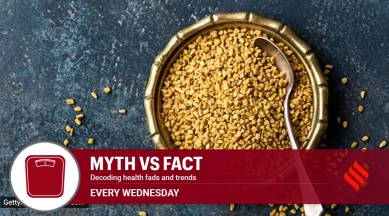How to have fenugreek or methi in safe amounts for blood sugar, heart disease
As a general guideline for healthy individuals, the recommended dose of fenugreek seed powder is 8-10 grams twice a day. When it comes to fenugreek supplements, consult a qualified dietician than suffer side effects, says Dr Eileen Canday, HOD, Nutrition and Dietetics, Sir H N Reliance Foundation Hospital and Research Centre, Mumbai

Fenugreek, also known as methi, is a versatile ingredient that has been used in Indian cuisine and traditional medicine for thousands of years. It is a rich source of vitamins and minerals such as iron, magnesium and vitamin B6, all of which play important roles in maintaining healthy energy levels, supporting the immune system and promoting healthy skin and hair. Additionally, it is rich in antioxidants such as flavonoids which can help protect the body against damage from free radicals and reduce the risk of chronic diseases such as heart disease and cancer.
But in our zeal for lifestyle correction, we should be careful about over-consumption of fenugreek. You should not take it as you please. So, let’s begin with understanding its health properties and then regulating consumption for our individual needs. Otherwise, we could have adverse reactions as well.
monthly limit of free stories.
with an Express account.
BENEFITS OF FENUGREEK
One of the most well-known benefits of fenugreek is its ability to help regulate blood sugar levels by slowing down the absorption of carbohydrates and improving insulin sensitivity in people with diabetes. In fact, one study found that taking fenugreek before meals helps regulate blood sugar levels in people with Type 2 diabetes. Fenugreek is also known to aid in improving digestion. Its seeds are high in dietary fibre which can help regulate bowel movements and prevent constipation. They also contain compounds that help stimulate the production of digestive enzymes, which can help break down food more efficiently and reduce bloating and gas. Additionally, fenugreek has been shown to help soothe inflammation in the digestive tract, which can help reduce symptoms of inflammatory bowel disease (IBD) and other digestive disorders. It promotes collagen production which can contribute to its anti-ageing property.
It may also help to increase milk production in nursing mothers, regulate serum cholesterol levels, boost the immune system and help with appetite control, but more research is needed in these areas to justify these findings across a vast swathe of population.
HOW MUCH IS TOO MUCH?
But given its overall goodness, we tend to forget that we should not over-consume it and some people should, in fact, be cautious about its consumption.
As for how much fenugreek to consume, there is no one-size-fits-all answer. The appropriate dosage varies depending on current health status and the form in which you are consuming, such as seeds, fresh leaves, dried leaves, powdered form, extract or concentrated forms. As a general guideline for healthy individuals, the recommended dose of fenugreek seed powder is 8-10 grams twice a day. When it comes to fenugreek supplements, it is advisable to consult a qualified dietician.
When consumed in higher doses than recommended, it may cause adverse effects in the gastrointestinal system such as diarrhoea, gas and bloating and rarely, even headaches. Large doses may cause a harmful drop in blood sugar. Excessive consumption can cause allergic reactions in some people, especially those who are allergic to peanuts or soybeans. Some cases of liver toxicity have been reported because of overuse of fenugreek, either alone or in combination with other herbs.
Pregnant women should be cautious while consuming fenugreek seeds and concentrates as they may stimulate uterine contractions and increase the risk of premature labour. Children should not have fenugreek as a supplement. If you are unsure about how much fenugreek to consume, it is always best to consult a healthcare professional and a qualified dietician.
THE BEST WAY TO INCLUDE FENUGREEK IS THROUGH THE DIET
Overall, fenugreek is a versatile and nutritious food that can offer a variety of health benefits. It is important to consume it in moderation and follow the recommended dosage instructions to obtain beneficial effects and prevent any toxicity.
Make it part of your everyday meal to avail benefits rather than building supplementation routines. Fenugreek seeds can be used as a tempering to season curries. They can be soaked overnight and the infused water can be had. Fresh leaves can be used to make vegetable mixes, pulaos, parathas, theplas, muthias and khakhras. Dried leaves can be used as a seasoning in curries, soups, curries and stews. The seeds are a typical component of many teas, infusions, marinades, sauces and spice blends like curry powder and garam masala, which can be used to flavour foods.